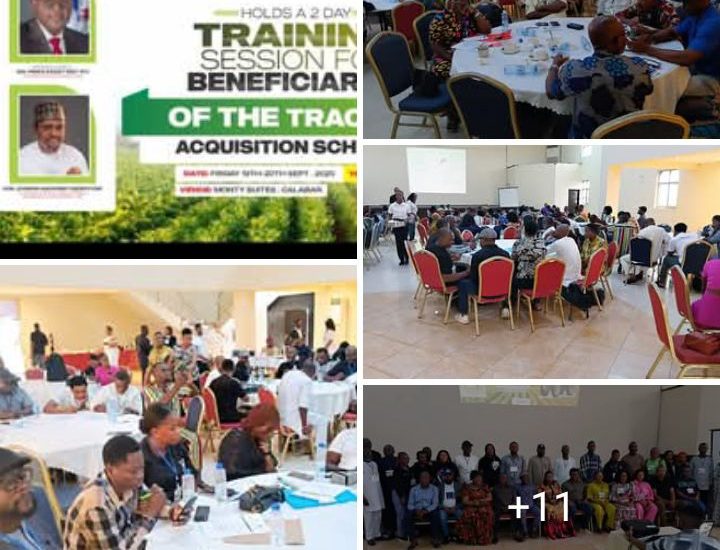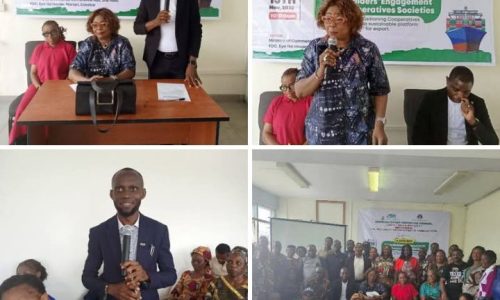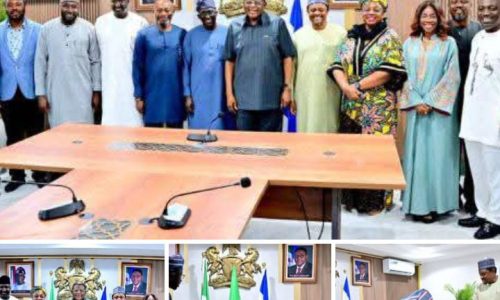C’RIVER GOVT KICKS OFF TRACTOR SUBSIDY TRAINING TO STRENGTHEN FOOD SECURITY
✓ Beneficiaries across 18 LGAs commence two-day training on tractor operation and management under cooperative-based scheme, with the deployment of 108 tractors- first year, and 324 projected in 3 years
By Amawu, Cletus Albert Amawu.
The Cross River State Government has launched a Tractor Subsidy Programme alongside a two-day training for beneficiaries at Monty Suites, Calabar, aimed at deepening agricultural mechanisation, reducing production costs, and strengthening food security across the state.
Governor’s Commitment to Agricultural Revolution
The launch of the subsidy programme was also tied to the broader agricultural transformation agenda of His Excellency, Apostle Senator Prince Bassey Edet Otu, Governor of Cross River State. The Commissioner recalled that during His Excellency campaign, the Governor made clear his aspiration to reduce fiscal waste and subsidise work, pledging to prioritise agriculture as a driver of inclusive growth.
Commissioner Ebokpo eulogised the Governor for his unwavering commitment, describing him as the visionary behind the state’s agricultural revolution. He noted that the Governor’s focus on tractorisation and mechanisation was not only to guarantee food security but also to secure feed security, given the growing need for affordable sources of protein through livestock and poultry production.
“The Governor has given agriculture a human face and a business focus. His determination to support smallholder farmers with mechanisation is a clear demonstration of his love for the people and his resolve to make Cross River a food basket for Nigeria,” the Commissioner remarked.
Speaking further, the Honourable Commissioner for Agriculture and Irrigation Development, Johnson A. Ebokpo, KSM, said the initiative was designed to tackle long-standing challenges faced by smallholder farmers, particularly the high cost of land preparation, which accounts for over 70 per cent of farming input costs.
According to him, 108 mini-medium tractors will be deployed across communities under a cooperative-based service provider model, rather than being distributed to individuals. He explained that the deliberately smaller, fuel-efficient tractors were selected to suit Cross River’s unique terrain while reducing the prohibitive costs associated with hiring large machines.
Farmers will make an initial payment (down payment) of ₦1.1 million and flexible monthly payment of ₦300,000 spread within 3 years- totally ₦10 million naira. “With tractors, farmers can expand from one hectare to two or three, thereby boosting yields and enhancing both food and feed security,” Ebokpo stressed, adding that feed production for livestock and poultry was also a key focus of the scheme.
The Commissioner further disclosed that future phases would include additional implements such as rotary tillers and gauge wheels to support rice farmers, particularly in flood-prone areas where recent flooding devastated farmlands. He urged cooperatives to uphold transparency and integrity in managing the machines, noting that the tractors are strictly for community service and not private ownership.
“Agriculture must be treated as a business. This programme provides an opportunity to improve productivity, reduce the cost of food, and reposition Cross River as a leading food producer in Nigeria,” he declared while officially declaring the training opened.
Training for Beneficiaries
At the opening of the Tractor Training Programme, Elder Dr Odey Ikongha, Permanent Secretary of the Ministry and Chairman of the Tractor Committee, emphasised that training was central to the government’s agricultural transformation agenda, ensuring beneficiaries were equipped with both technical and managerial skills to sustain the tractors as cooperative assets.
“This gathering reflects the shared commitment of government and stakeholders to advance mechanised farming. I urge participants to seize this opportunity, engage fully, and return prepared to drive agricultural productivity in their communities,” Dr Ikongha said.
Also speaking, Hon. Bette Obi, Chairman of the House Committee on Agriculture in the Cross River State House of Assembly, commended the Ministry and its technical team, particularly Engr (Mrs) Justina Ulafor, Director of Mechanisation and Irrigation Development, for their commitment. Describing mechanisation as key to agricultural transformation, he observed: “What one tractor can achieve, fifty people cannot.” He urged participants to cascade the knowledge gained to farmers in their localities to multiply the programme’s impact.
Resource Persons and Technical Sessions
The training featured technical presentations from:
Engr (Mrs) Justina Ulafor, Director- Mechanisation and Irrigation Development, who covered tractor basics, components, routine maintenance, troubleshooting, fuel efficiency, and best practices;
Elder Dr Nicolas Dan, Director of Finance and Supply at the Ministry, who spoke on financial sustainability and accountability in cooperative service delivery; and
Mr Denis Ikpali, Coordinator of the Project Grow Programme, who described the scheme as a revolutionary step in Cross River’s agricultural journey.
Ikpali urged participants to apply the knowledge gained to transform farms, uplift communities, and contribute to agricultural growth across the state.
Beneficiaries were drawn from all 18 Local Government Areas.
The two-day training continues tomorrow with a call for transparency, collaboration, and continuous capacity-building to ensure the Tractor Subsidy Programme achieves its goal of making Cross River a model of sustainable mechanised agriculture in Nigeria.





